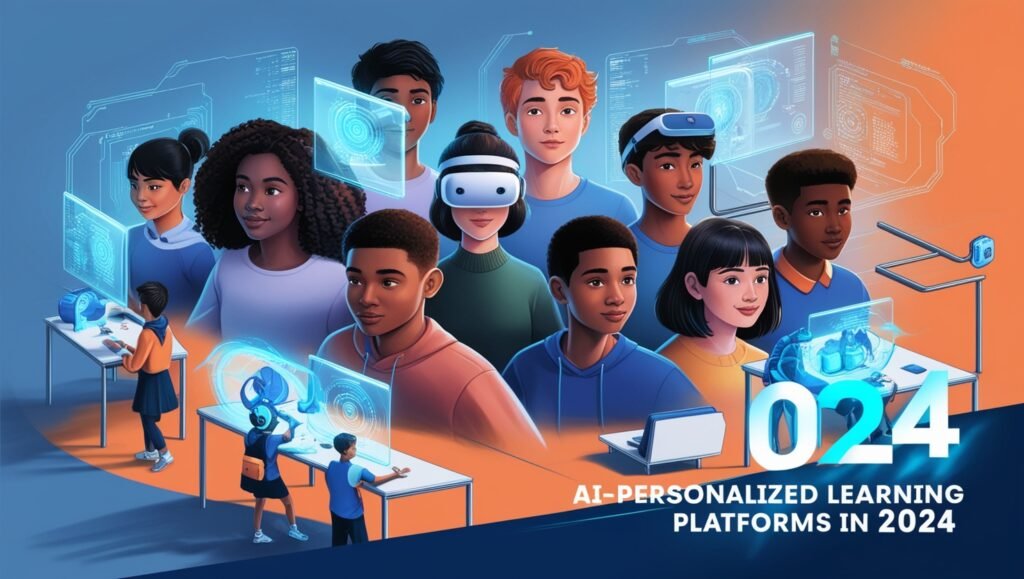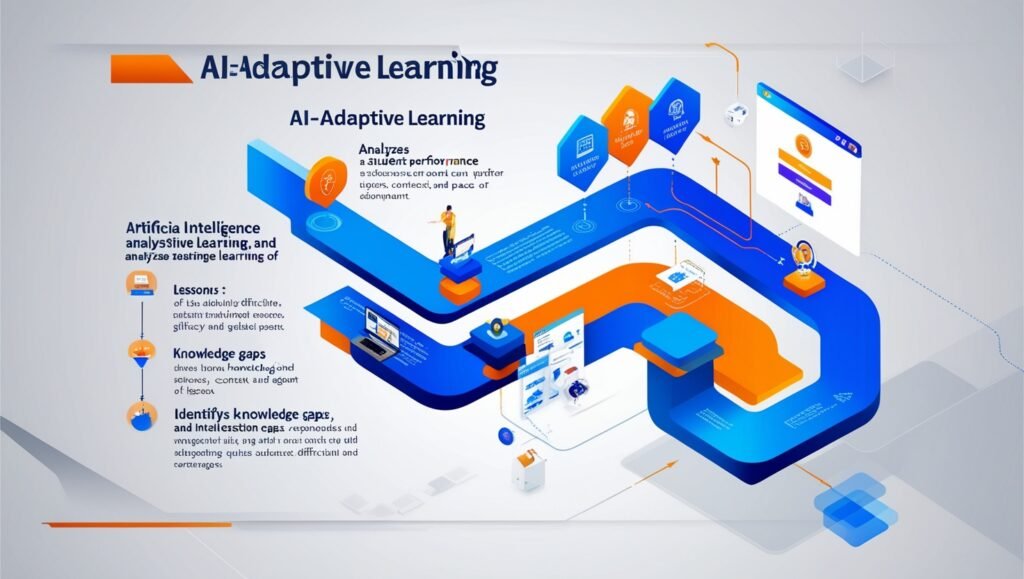AI-Powered Personalized Learning Platforms in 2024: Transforming How We Learn

In this new era of 2024, AI-powered personalized learning platforms are taking center stage, offering students customized educational experiences that adapt to their individual needs. These platforms allow learners to progress at their own pace, improve their understanding, and achieve better outcomes. Let’s explore how these innovative tools are reshaping education and what makes them so impactful.
Table of Contents
ToggleWhat Are AI-Powered Personalized Learning Platforms?
AI-powered personalized learning platforms use advanced algorithms and data analysis to create tailored educational experiences for each student. Unlike traditional one-size-fits-all methods, these platforms provide content, pacing, and different types of approach to suit each learner’s preferences and best progress.

Adaptable Lessons
One of the key strengths of AI-driven learning is the ability to adapt lessons in real time based on student performance. As learners move through content, AI continuously assesses their understanding and adjusts the complexity or focus of the material accordingly. This means each student receives a learning experience specifically tailored to their needs, allowing them to learn at their own pace without feeling overwhelmed or left behind.
Insights of Data
AI platforms collect valuable data about how students interact with content, providing both teachers and students with clear insights into progress and areas for improvement. This allows educators to make data-driven decisions about lesson planning and support, while students can better understand their strengths and weaknesses. With these real-time analytics, both students and teachers can stay on track and ensure that learning is progressing as it should.
Interactive Formats
To keep students engaged, AI-powered platforms often incorporate interactive formats like videos, quizzes, mind games and simulations, and hands-on activities. These dynamic methods of content delivery cater to different learning styles and help reinforce concepts through active participation. For example, students might interact with virtual simulations or test their knowledge with instant quizzes, making learning both fun and effective.
Real-Time Feedback
Immediate feedback is a game-changer in personalized learning. AI platforms provide instant corrections and tips, allowing students to learn from their mistakes as they happen. This type of feedback accelerates the learning process, builds confidence, and helps students stay on track. By removing the delay between action and correction, AI ensures that learners continuously improve and feel supported throughout their learning journey.
How AI Adapts to Different Learning Styles

Every student learns in their own different style, and here’s AI playing an impressive game that is exceptional at recognizing and adapting to these differences. AI tracks how students engage with material, adjusting the learning process to deliver what works best for each individual.
- Visual Learners benefit from videos, charts, and infographics that make complex concepts easy to understand.
- Auditory Learners thrive with podcasts, voice-over lessons, and text-to-speech tools.
- Kinesthetic Learners excel with hands-on simulations and interactive exercises.
The Role of Generative AI in Education
Generative AI tools, such as ChatGPT and Bard, are changing how students learn by providing personalized, interactive learning experiences. These advanced AI systems are not only helping with content creation but also offering a more efficient and customized approach to education.

Creating Custom Study Guides and Notes
Generative AI can automatically create tailored study guides, summaries, and notes based on the curriculum or specific topics students are working on. This allows students to focus on the most relevant content, saving time and ensuring they aren’t overwhelmed with unnecessary information. For example, ChatGPT can break down complex topics into simple, easy-to-understand formats while highlighting key concepts for review. This level of personalization enhances understanding and retention.
Answering Student Queries in Real-Time
One of the most transformative aspects of generative AI in education is its ability to provide real-time assistance. Students can ask questions and receive immediate, context-specific answers, eliminating the need to wait for an instructor or peer. This on-demand support keeps students engaged, clears up confusion quickly, and allows learners to continue progressing in their studies. Whether it’s clarification on a math problem or deeper insights into a scientific concept, generative AI serves as a personal tutor available 24/7.
Designing Practice Problems and Simulations Based on Individual Needs
Generative AI excels at creating adaptive practice problems and simulations tailored to each learner’s progress and proficiency. If a student struggles with a specific topic, AI can generate additional questions to target weak areas, reinforcing the material. AI-generated simulations can also immerse students in virtual environments where they can apply their knowledge in real-world scenarios. This personalized approach ensures learners receive the right challenges at the right time, optimizing their ability to master the material.
The Benefits of Personalized Learning

Learning at Your Own Pace
Artificial Intelligence allows students to take their time with challenging subjects and move faster through material they already understand. This flexibility makes learning less stressful and more effective.
Better Engagement
By presenting content in formats students enjoy, AI keeps them motivated and curious. Gamified features like rewards and challenges add an element of fun to the learning process.
Improved Academic Performance
Tailored content and feedback help students strengthen weak areas, leading to better academic results. AI ensures no gaps in understanding are left behind, enabling students to master each subject thoroughly.
Support for Educators
AI isn’t here to replace teachers—it’s here to support them. These tools provide educators with valuable insights into student progress, allowing them to offer personalized guidance and more targeted support.
Few Examples of AI-Powered Personalized Learning Platforms

Duolingo:
Duolingo is a widely-used language learning app that employs AI to personalize lessons based on the learner’s proficiency level and preferred learning style. It continuously adjusts exercises during lessons, analyzing performance to target areas where a learner may be struggling, offering a tailored learning experience. The app features gamified elements, such as streak tracking and real-time feedback, keeping users motivated as they progress through the language. Whether you are a beginner or an advanced learner, Duolingo is designed to make learning fun and accessible for all levels, offering courses in dozens of languages.
- Key Features: Gamified learning, personalized lesson plans, streak tracking, real-time feedback, adaptive difficulty levels.
- Ideal For: Anyone from beginners to advanced learners looking to master a new language, from casual learners to those serious about fluency.
Khan Academy:
Khan Academy is a free online educational platform that uses AI-powered tools to offer personalized learning experiences for students of all ages. The platform tracks learners’ progress, provides recommendations, and customizes lessons based on individual performance, ensuring that students receive targeted practice where they need it the most. With its mastery-based progression model, Khan Academy makes learning engaging and accessible for everyone, offering free resources in subjects ranging from mathematics and science to history and the arts. Teachers and parents can also track student progress through the platform’s dashboards, making it an excellent tool for educators and lifelong learners alike.
- Key Features: Adaptive learning pathways, personalized dashboards, interactive exercises, free resources, mastery-based progression.
- Ideal For: Students, educators, and lifelong learners seeking high-quality, self-paced education without any cost barriers.
Coursera:
Coursera is a prominent online learning platform that partners with top universities and organizations to provide formal and informal education in the form of courses, certifications, and degree programs. Its AI system personalizes learning paths by suggesting courses tailored to your interests, career goals, and previous learning history. As learners progress, the AI adapts the course material to suit their evolving needs, enhancing the learning experience. Coursera’s courses are often followed by certification upon completion, recognized by employers and academic institutions, making it an excellent choice for professionals seeking career advancement or anyone looking to further their education.
- Key Features: Personalized course recommendations, progress tracking, employer-recognized certificates, partnership with top universities.
- Ideal For: Professionals, students, and anyone seeking formal education, certification, or skill-building to boost their career.
Quizlet:
Quizlet is a powerful study tool designed to help students create personalized study plans using AI-driven features. The platform generates custom flashcards, quizzes, and practice tests based on users’ study habits and past performance, allowing learners to focus on areas that need improvement. Utilizing spaced repetition, Quizlet ensures that learners retain information by revisiting key concepts at optimal intervals. In addition to traditional study aids, Quizlet provides performance analytics that show detailed insights into a learner’s progress, helping them focus their efforts effectively. This makes it an invaluable tool for students preparing for exams, professionals studying for certifications, and anyone looking to improve their knowledge retention.
- Key Features: Spaced repetition, AI-generated flashcards, quizzes, performance analytics, personalized study plans.
- Ideal For: Students, exam takers, professionals, and lifelong learners who want a tailored and effective study experience.
Final Thoughts
The rise of AI-powered personalized learning platforms in 2024 is transforming education. These tools offer a unique, tailored learning experience that allows students to learn at their own pace and improves their academic performance. As AI continues to evolve, the future of education looks brighter than ever.
Whether you’re a student, parent, or educator, it’s clear that AI is reshaping the future of learning. The question isn’t whether AI will play a role in education—it’s how big that role will be.